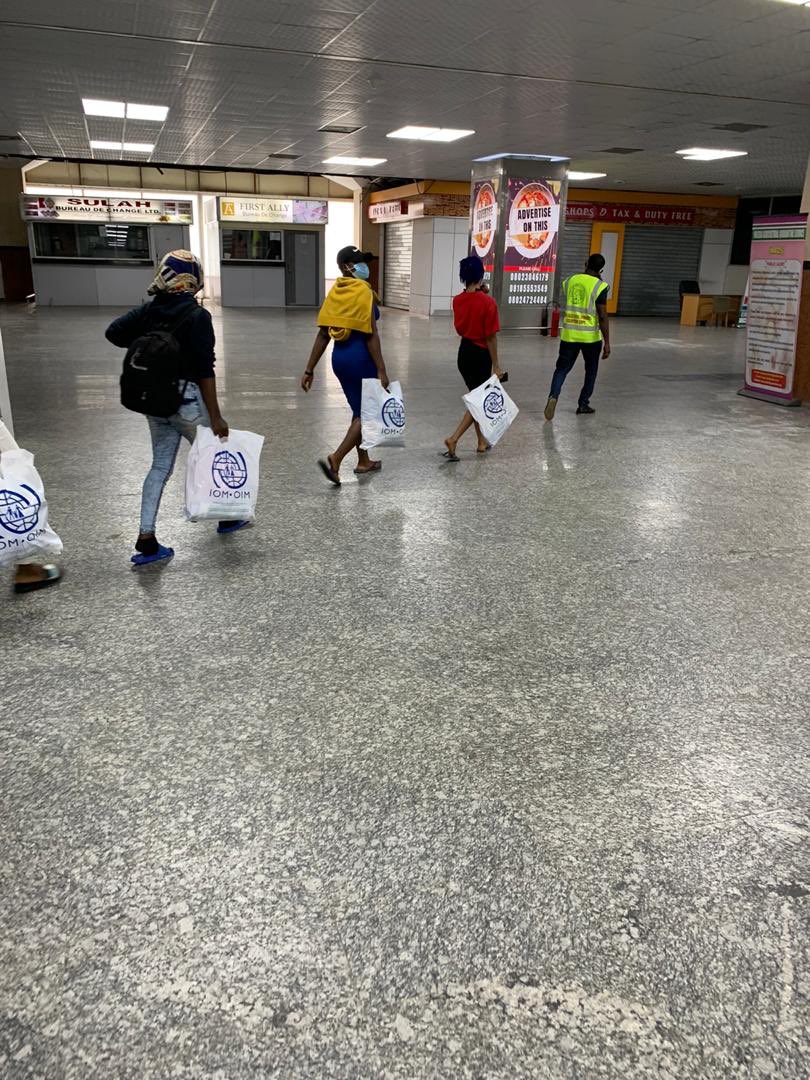Some 109 trafficked Nigerian girls have been evacuated back to the country through Mali, the International Organization for Migration (IOM) has disclosed.
IOM disclosed this in a statement published on its website on Wednesday titled “Homecoming: 109 Stranded Nigerians Return from Mali Via Humanitarian Corridor“.
According to the humanitarian organisation, on 28 July, 109 Nigerian migrants returned safely from Mali on a long-awaited charter flight organized by the International Organization for Migration (IOM) with the support of the United Kingdom’s Department for International Development (DFID) and the European Union (EU) through its Regional Direct Assistance Fund.
The flight—the first of its kind in Nigeria since the onset of the COVID-19 pandemic—is the result of sustained negotiations between the governments of Mali and Nigeria to establish a humanitarian corridor, a mechanism that has allowed over 2,200 stranded migrants return safely and voluntarily throughout West Africa amid border closures.
“Humanitarian corridors are a much-needed alternative for thousands of stranded migrants who would otherwise remain in their countries of transit or destination with limited access to basic services,” said Saskia Kok, IOM Programme Manager, Migrant Protection and Assistance, in Nigeria.
“Our duty now is to provide these returnees with all the necessary support to ensure their successful reintegration back home,” added Kok.
Before the pandemic, Nigerians stranded in Mali had been able to return within 30 days.
In recent months, however, their wait has been prolonged owing to the border closures announced by governments to prevent the spread of COVID-19.

Prior to departure, the returnees—including 12 pregnant women and new mothers tested negative for SARS-CoV-2 and received hygiene kits containing face masks and other protective gear.
“The months of waiting have been difficult for these young Nigerians who were eagerly waiting to be reunited with their families.
“We have done our utmost to ensure that they were accommodated in the best possible conditions in our centers as they awaited the return to their home country,” said Pascal Reyntjens, IOM Chief of Mission in Mali.
Upon arrival, they will undergo a 14-day quarantine period and will subsequently receive financial support and transportation to their communities of origin.
IOM will provide mental health and psychosocial support and training to help them kickstart income-generating activities as part of their reintegration assistance.
Amid ongoing movement restrictions in Nigeria, the pandemic has put a strain on the livelihoods of returnees and their communities.
A recent assessment by IOM revealed that 96 per cent of 105 Nigerian returnees consulted in Edo and Delta states were worse-off financially compared to before the start of the pandemic. Related Posts
The statement continues: “In addition to lower income, beneficiaries’ purchasing power has also taken a hit.
“Three-quarters of Nigerian respondents reported that food and basic items had become more expensive than previously.
“Between April and July 2020, 839 returnees across various projects have received reintegration counseling including socio-economic assistance from IOM in Nigeria.
“Since 2017, 629 Nigerians, mostly women between the ages of 18 and 25, have returned voluntarily from Mali with support from DFID and the EU through the EU-IOM Joint Initiative for Migrant Protection and Reintegration.”
IOM continues to provide support to the Nigerian COVID-19 Presidential Task Force for the opening of humanitarian corridors to safely and voluntarily bring back migrants stranded abroad.
About IOM Nigeria
IOM, the UN Migration Agency, supports humane and orderly migration in Nigeria and around the world
Nigeria continues to experience high internal and external migration due to the size of its population, economic climate, as well as its porous borders.
The Government of Nigeria has continued to give more attention to migration management.
This is evidenced by:
- the additional responsibilities given to the National Commission for Refugees (NCFR) in 2009 to oversee issues relating to migration and IDPs,
- ongoing dialogue with the European Union,
- the planned projects under the 10th National European Union Development Fund (EDF) and,
- the recent appointment of a Senior Special Assistant to the President on Diaspora Affairs.
Since 2002, based on a Cooperation Agreement, IOM has been supporting the efforts of the Government of Nigeria to manage migration through capacity-building, advisory services, and technical assistance on migration matters.
This includes migration health and information, assisted voluntary returns, and counter-trafficking.
Strong collaboration has been established with national migration stakeholders in order to enhance border management, fight trafficking in persons, reduce irregular migration, and mainstream migration in the country’s development plans.
Source: Kingsley U.
